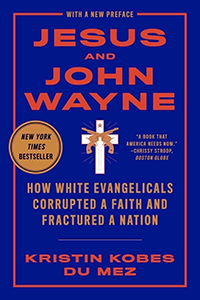Jesus and John Wayne
“Jesus and John Wayne: How White Evangelicals Corrupted a Faith and Fractured a Nation” by Kristin Kobes Du Mez is a provocative and critical examination of the intersection between evangelical Christianity, masculinity, and American culture. Here’s a summary of the key themes and arguments presented in the book:
Evangelical Masculinity: Du Mez explores how evangelicalism has promoted a particular form of masculinity that emphasizes strength, dominance, and traditional gender roles. This ideal, often embodied in figures like John Wayne (the rugged, individualistic hero), has shaped evangelical attitudes towards politics, family life, and social issues.
Political Influence: The book examines how evangelical leaders and institutions have wielded significant political influence, particularly in shaping conservative agendas on issues such as gender roles, sexuality, abortion, and patriotism. This influence has had profound implications for American politics and policies over the decades.
Gender Roles and Family: Du Mez discusses how evangelical teachings on gender roles and family life have reinforced patriarchal structures, limiting the roles of women and promoting a hierarchical view of marriage and family that aligns with conservative values.
Militarism and Patriotism: The book explores the intertwining of evangelical Christianity with militarism and patriotism. Du Mez argues that evangelical leaders have often equated Christian values with American nationalism and military strength, promoting a “muscular Christianity” that glorifies war and violence as part of defending faith and country.
Cultural Shifts: Du Mez traces historical shifts within evangelicalism, from its roots in revivalism and social reform to its alignment with conservative political ideologies and cultural wars of the late 20th century. She critiques how these shifts have sometimes prioritized political power and cultural influence over spiritual and ethical considerations.
Media and Pop Culture: The book analyzes the role of media and popular culture in shaping evangelical beliefs and attitudes, particularly through figures like John Wayne in film and media representations of masculinity that have influenced evangelical ideals.
Critique of Leadership: Du Mez critiques evangelical leadership for promoting a narrow view of Christian faith that aligns more with cultural and political conservatism than with the teachings of Jesus Christ as understood in broader Christian traditions.
Controversies and Responses: “Jesus and John Wayne” has sparked controversy within evangelical circles for its critique of deeply held beliefs and practices. Some have praised it for its scholarly analysis and critique of cultural trends, while others have criticized it for what they perceive as an unfair portrayal of evangelicalism.
Overall, Du Mez’s book offers a thought-provoking examination of how evangelical Christianity has intersected with American culture, politics, and gender norms, arguing that certain expressions of evangelicalism have prioritized cultural power and political influence over the teachings of Jesus Christ.

